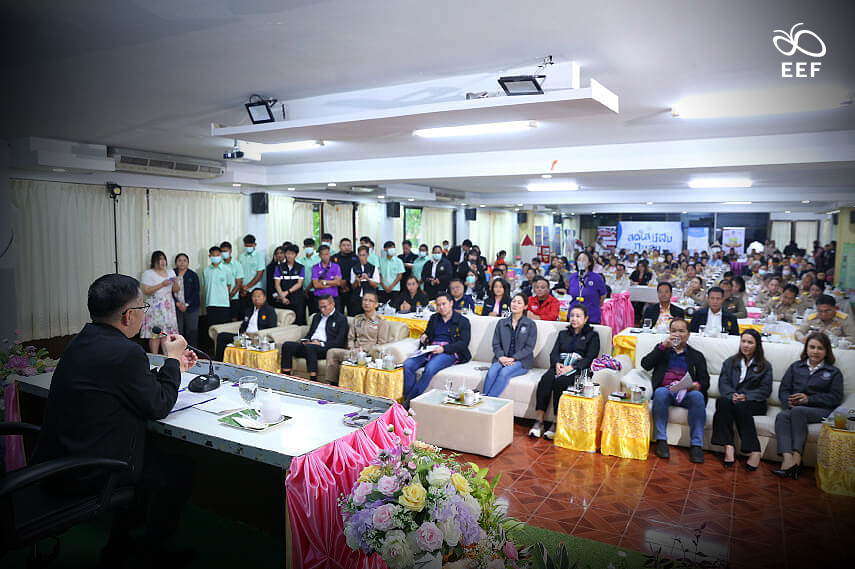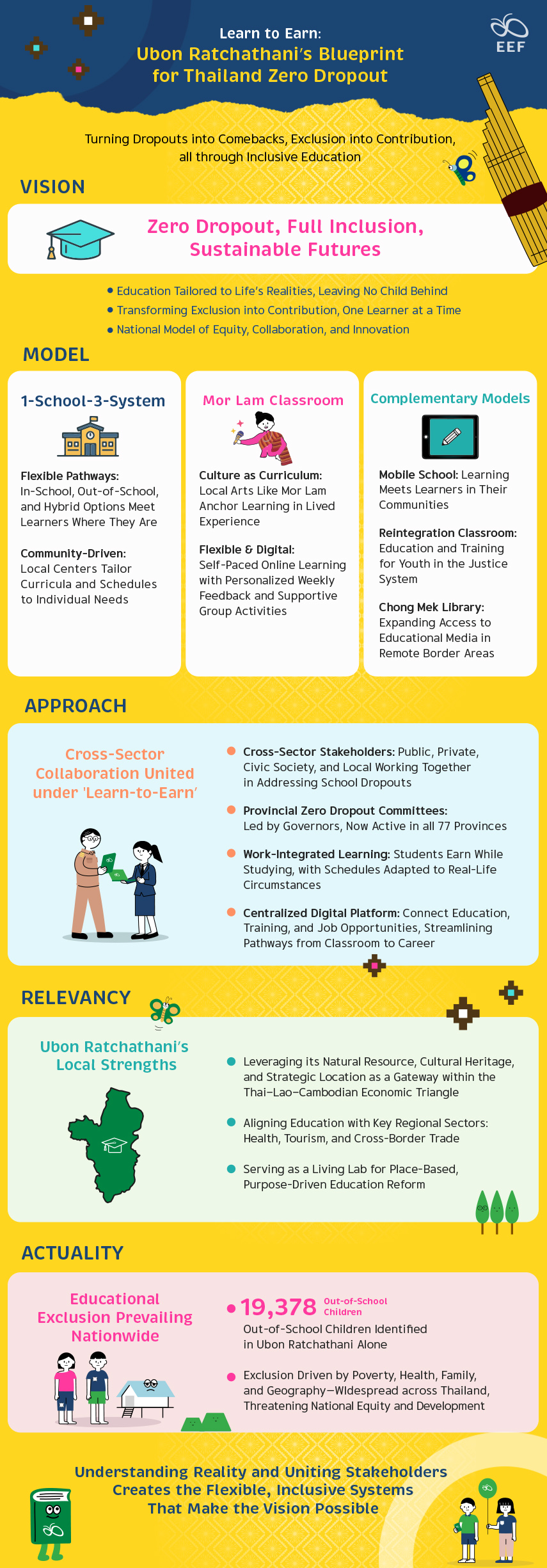
During his visit to Ubon Ratchathani, public, private, civic society, and local sector stakeholders convened in a shared war room, united by a common goal: to transform educational exclusion into opportunity through tailored, cross-sector collaboration rooted in community needs. The Chairman of the National Thailand Zero Dropout (TZD) Committee officially opened the war room and charted a decisive course. Following the May 2024 Cabinet Resolution, all 77 provinces have formed “Zero Dropout Committees,” each led by its respective governor, to coordinate comprehensive, locally tailored support for every child’s unique life circumstances. In Ubon Ratchathani, this approach has yielded tangible results: 19,378 children and youth aged 3 to 18, previously outside the formal educational system, have been identified, nearly all located. Yet, identification alone does not suffice; what follows is the creation of a flexible educational ecosystem that adapts to the diverse aspirations and realities of every learner.

At the heart of this transformation lies the nationwide rollout of the “Learn to Earn” initiative, spearheaded by the national TZD committee and the Equitable Education Fund (EEF) Thailand. Combining formal schooling, vocational training, and income opportunities, the model empowers learners to schedule their studies around work, pursuing qualifications while earning a living. This synergy between learning and earning lays the foundation for long-term self-reliance and meaningful community contribution. Yet, momentum does not pause there; a centralized digital platform—currently in development—will integrate education, training, and job-matching data, streamlining pathways from classroom to career. Led by the Ministry of Digital Economy and Society alongside partners including the Ministry of Education, the EEF, and the Thailand Professional Qualification Institute (TPQI), the platform promises seamless access to diverse learning environments tailored to everyday realities.
Already, these environments take shape in Ubon Ratchathani. Piloted at Warin Chamrap School, the “1-School-3-Models” model reimagines education through flexibility and relevance. Offering in-school, out-of-school, and hybrid pathways, it serves learners excluded by poverty, health, family disruption, or geography; students gain academic knowledge, life skills, and vocational training through real-world experiences, earning income while working toward formal qualifications. Flexible and adaptable, the system’s strength lies in its responsiveness: community learning centers—run by non-profits under the supervision of the Office of Basic Education Commission (OBEC)—design personalized curricula and schedules suited to each learner’s environment. Now, every adult—parent, artisan, entrepreneur, elder—becomes a potential educator; every space—farm, forest, market, music group—a classroom. Teaching draws on collaboration among teachers, vocational experts, and civil society partners, while assessment prioritizes practical skills and real-life outcomes. By bridging learning with livelihood, the model creates a sustainable, inclusive path forward.

On the other hand, the “Mor Lam Classroom” at the Infinite Intelligence Foundation, where local culture and performance arts like Mor Lam become vehicles of engagement; mathematics unfolds through calculations of stage dimensions, social studies—through research into Isaan traditions. Here, formal education intersects with lived experience, offering a hands-on, adaptable path back into learning for those outside the traditional system, along with renewed hope for qualifications, career advancement, and self-sufficiency. Learning happens mainly online, without fixed schedules, yet retains academic rigor via weekly personalized feedback replacing delayed, exam-based assessments, enabling learners to track their growth and address areas for improvement in real time. Meanwhile, occasional group activities recreate the emotional support of classrooms, helping learners forge friendships and rediscover community amid work and study.
Complementing are other models. The “Mobile School” integrates academic learning with community projects, nurturing responsibility and reshaping futures. The “Reintegration Classroom for Youth in the Justice System,” run by local juvenile centers, provides tailored education and skills training to rebuild lives. Meanwhile, the “Chong Mek Library” expands access to quality educational media in remote border communities, bridging geographic isolation. Together, these innovative models redefine what education can be—now flexible, inclusive, and grounded in the realities of learners’ lives—offering diverse, dignified pathways toward knowledge, opportunity, and belonging.
Grounding these “Learn to Earn” endeavors are Ubon Ratchathani’s unique strengths. Blessed with a strategic location and a rich cultural heritage—home to landmarks such as Pha Taem and the Mekong, Chi, and Mun Rivers—the province serves as a vital gateway within the Thai–Lao–Cambodian economic triangle, where sectors such as health, tourism, and cross-border trade can thrive through education-to-employment pipelines tailored to local contexts. As the initiative unfolds, the Deputy Prime Minister has urged all stakeholders to co-create a vision rooted in local strengths. The private sector, he emphasized, must lead in human capital development, investing in talent deeply connected to place. “This is our shared responsibility,” the Chairman declared. “This is not just about finding those who’ve fallen out of the system; rather, it’s about building new paths that lead every child back to learning, purpose, and the dignity they deserve.”

This vision came to life when the Chairman of the National TZD Committee awarded education certifications to out-of-school youth who completed studies at the Infinite Intelligence Foundation. More than ceremony, this moment signalled that flexible, accessible education models can—and do—work. Ubon Ratchathani has demonstrated how cross-sector collaboration, centered on learners’ lives, can yield transformative results. Anchoring this overarching effort is the May 2024 Cabinet Resolution, which outlines four pillars: 1) integrated data sharing across agencies; 2) case-specific support tailored to local contexts; 3) flexible, need-based education; and 4) learning paired with income generation through the “Learn to Earn” approach. Together, these pillars form a cohesive, future-focused framework that transforms educational access and equity nationwide, leaving no child behind.
Ubon Ratchathani showcases a paradigm shift in Thailand’s educational inclusion, where flexible, community-driven models like the “1-School-3-Models,” “Mor Lam Classroom,” and “Mobile School” converge within the “Learn to Earn” framework to meet learners exactly where they are. Cross-sector collaboration—uniting public, private, civic society, and local sectors—tackles entrenched barriers that have historically kept children and youth out of schooling. By embedding academic learning in lived contexts, providing tailored reintegration, and leveraging digital and mobile platforms, the province advances toward ending school dropouts and fostering sustainable self-reliance.
Championing this mission is the Equitable Education Fund (EEF)—a leading organization committed to advancing education equity and inclusion across Thailand—promoting innovative, learner-centered solutions rooted in “Learn to Earn.” Beyond traditional schooling, the EEF drives systemic change that is both scalable and deeply responsive to local diversity. For a proof so tangible, one should look no further than the success in Ubon Ratchathani: equity-focused policies, bolstered by collaboration and innovation, can dismantle obstacles and empower every child to realize their full potential. Through this, not only does the EEF not only fulfill its mandate, but it also sets a powerful national example, ensuring no learner is left behind and that every path forward is paved by the promise of learning while earning.
All For Education is all about people; only when all is in for education is Education For All. Join the movement to reduce educational inequality. Support the EEF by donating to fund research, partnerships, and assistance for children, youth, and adults in need of educational support. Click the link to contribute today and help create a society where education is open and equal for all. Together, we can make a lasting impact.
Source:

